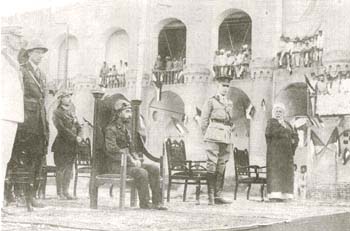 Surrounded by British officials, Faisal is proclaimed King of Iraq (1921) |
To understand the current Iraq crisis, we must look at events and interests that shaped the modern history of the country. This section looks particularly at how Western powers – notably the UK and the US – have used their military might and commercial prowess to dominate Iraq and control its oil resources. The story includes the secret battles between Britain and France over Iraqi oil in the World War I era, Winston Churchill's 1920 plan to control colonial Iraq from airplanes armed with mustard gas bombs, and more recent developments such as Iraq's nationalization of its oil resources in the early 1970s, CIA support for the coup that first brought Saddam Hussein's Ba'ath Party to power, and the US supplies of chemical and biological warfare materials to Hussein's government in the 1980s. This section includes excerpts from books and articles by some of the leading historians of modern Iraq such as Hanna Batatu, Peter and Marion Sluglett and Charles Tripp, as well as statements by George Bush Sr., former US Secretary of State James Baker, British colonial figures Gertrude Bell and T.E. Lawrence, and other key documents and analyses.
History of Oil in Iraq
Britain took the lion's share of Iraq's oil by gaining military control of the country during World War I. The powerful Iraq Petroleum Company, in which US and French interests held minority positions, kept a monopoly of Iraq's oil sector until nationalization in 1972.
British Colonialism and Repression in Iraq
Britain set up a colonial regime in Iraq after a long military campaign during World War I. In response to Iraqi resistance, British forces battled for over a decade to pacify the country, using airplanes, armored cars, firebombs and mustard gas. Winston Churchill, as responsible cabinet minister in the early years, saw Iraq as an experiment in high-technology colonial control.
US and British Support for Hussein Regime
US intelligence helped Saddam's Ba`ath Party seize power for the first time in 1963. In the 1980s, the US and Britain gave Saddam arms, money, satellite intelligence, military advisors and even chemical & bio-weapon precursors.
Gulf War and a Decade of Sanctions
US high-pressure tactics in the Security Council lined up support for the war that ousted Iraq from Kuwait. A punishing air campaign, followed by years of sanctions, took a heavy toll on civilians. Though Council resolutions focused on weapons, and said nothing about regime-change, the US and UK announced in 1991 that their policy aimed at nothing less than overthrowing Saddam Hussein.

